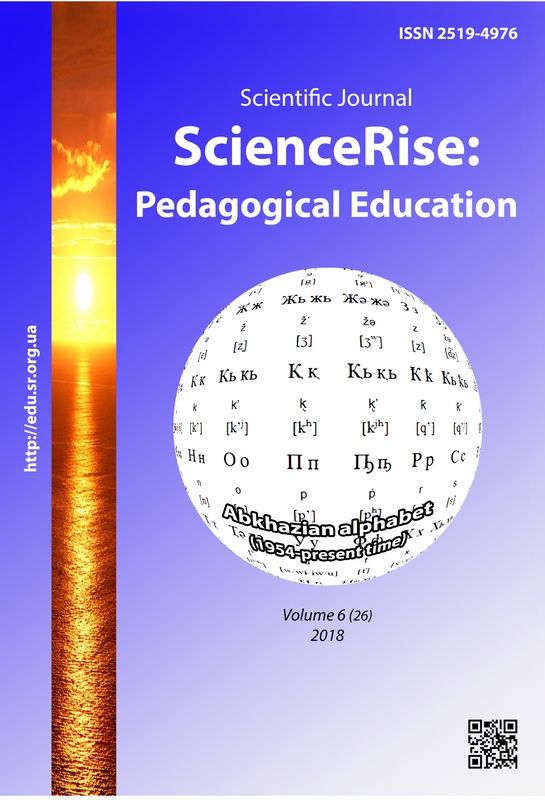German universities at the stage of their radical reforming
DOI:
https://doi.org/10.15587/2519-4984.2018.143347Keywords:
evaluation, the concept, model, discourse, forecasting, planning, innovation, diversification, autonomy, differentiationAbstract
The present state of the German universities in the context of their actual reformation, which is carried out through the introduction of Anglo-Saxon models of university education, is researched. First of all, it concerns university education transformation in accordance with the American higher education model, since the American university model is considered to be the most successful in European academic circles. However, German university scholars criticize this model (or models) for "marketization" of the university activities and for "mercantilising" scientific knowledge. It is determined that German scholars are skeptical about these processes, because in their opinion, this can lead to an increase in the "McDonaldization" of society, that leads to the unification of social forms of society life and to the loss by the German university as a sociocultural institution of its national identity and its achievements. As you know, this culture was formed under the influence of the ideas of Wilhelm von Humboldt and was the key to the success of German universities for many decades. Many influential representatives of German academic science do not accept the idea of turning universities into factories for the production of an educational product with a certain set of market qualities, which is envisaged by the implementation of the main components of the American university model and program provisions of the Bologna Declaration. In this case, it concerns, first of all, the professional training of specialists, mainly undergraduate graduates who do not have a broad scientific world outlook and the necessary personal qualities to solve complex daily problems, but possess formed "key competencies." Secondly, it concerns producing knowledge, which is necessary, first of all, for international corporations, and not for society as a whole. In addition, German scientists do not imagine the possibility of planning scientific knowledge production or the realization of scientific discoveries, which, in their opinion, is not a predictable process, but a result of the constant search for truth in conditions that exclude external influence and control. It has been established that German experts insist on the development of clear and objective criteria for the concentration of the results of the university activities, their units and individual scientists, which take into account not only the quantitative scientific research parameters, but also qualitative ones. The development of such criteria, in the opinion of German specialists, is the work of scientists themselves, not external structures in the form of accreditation agencies, supervisory boards, etc.
References
- Wimmer, M. (2005). Die überlebte Universität. Zeitgemäße Betrachtungen einer „unzeitgemäßen“ Institution. Bildung der Universität, 19–42. doi: https://doi.org/10.14361/9783839403167-001
- Hochschulrahmengesetz (HRG). Available at: https://www.hrk.de/fileadmin/redaktion/A4/Hochschulrahmengesetz__HRK_.pdf
- Roland, B., Monique, L. (2012). More Students and Better Teaching? Teaching at German Universities between Capacity and Quality. Vortrag auf der SRHE-Jahrestagung 2012.
- Dohmen, D., Wrobel, L. (2018). Entwicklung der Finanzierung von Hochschulen und Außeruniversitären Forschungseinrichtungen seit 1995. Endbericht einer Studie für Deutscher Hochschulverband. Berlin: Forschungsinstitut für Bildungs- und Sozialökonomie (FiBS).
- Enders, J. (2016). Differenzierung im deutschen Hochschulsystem. Handbuch Wissenschaftspolitik, 503–516. doi: https://doi.org/10.1007/978-3-658-05455-7_29
- Hüther, O., Krücken, G. (2018). Higher Higher Education in Germany – Recent Developments in an International Perspective. Springer. doi: https://doi.org/10.1007/978-3-319-61479-3
- Kaina, V. (2004). Deutschlands Eliten zwischen Kontinuität und Wandel. Empirische Befunde zu Rekrutierungswegen, Karrierepfaden und Kommunikationsmustern. Aus Politik und Zeitgeschichte, 8–16.
- Konietzka, D. (2010). Berufliche Ausbildung und der Übergang in den Arbeitsmarkt. Bildung als Privileg. Springer, 277–304. doi: https://doi.org/10.1007/978-3-531-92484-7_10
- Kreckel, R. (2012). Die Forschungspromotion. Internationale Norm und nationale Realisierungsbedingungen // Der Doktortitel zwischen Status und Qualifikation (IFQ-Working Paper, no. 12/2012), 141–160.
- Kreckel, R. (2017). On Academic Freedom and Elite Education in Historical Perspective: Medieval Christian Universities and Islamic Madrasas, Ottoman Palace Schools, French Grandes coles and 'Modern World Class Research Universities'. SSRN Electronic Journal. doi: https://doi.org/10.2139/ssrn.3081429
- Morkel, A. (2010). Die Universität muss sich wehren. Ein Plädoyer für ihre Erneuerung. Darmstadt.
- Hoffmann, D., Neumann, K. (2003). Ökonomisierung der Wissenschaft: Forschen, Lehren und Lernen nach den Regeln des „Marktes“. Beltz.
- Fuchs, P. (2002). Hochschulen in Trivialmaschinen. Taz Archiv, 15.
Downloads
Published
How to Cite
Issue
Section
License
Copyright (c) 2018 Sergiy Tcherkashyn

This work is licensed under a Creative Commons Attribution 4.0 International License.
Our journal abides by the Creative Commons CC BY copyright rights and permissions for open access journals.
Authors, who are published in this journal, agree to the following conditions:
1. The authors reserve the right to authorship of the work and pass the first publication right of this work to the journal under the terms of a Creative Commons CC BY, which allows others to freely distribute the published research with the obligatory reference to the authors of the original work and the first publication of the work in this journal.
2. The authors have the right to conclude separate supplement agreements that relate to non-exclusive work distribution in the form in which it has been published by the journal (for example, to upload the work to the online storage of the journal or publish it as part of a monograph), provided that the reference to the first publication of the work in this journal is included.







